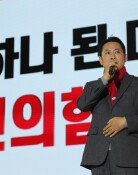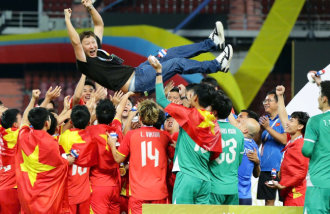N. Korea faces greater pressure in tension-growing inter-Korea relation
N. Korea faces greater pressure in tension-growing inter-Korea relation
Posted August. 25, 2015 01:17,
Little progress has been made in the stage to make a joint statement at the talks between top-level military officials from South and North Korea that started on Saturday. The two Koreas have reached a consensus in main agendas that North Korea will accept South Koreas demand of apology for landmine blasts in the DMZ and South Korea will stop anti-Pyongyang broadcasting. However, both sides confronted with tensions over sentences of North Koreas apology.
At the meeting with senior secretaries on Monday, South Korean President Park Geun-hye said, We need a clear apology and measures to prevent a recurrence. Otherwise, we will take appropriate steps and continue loudspeaker broadcasts. Park stressed that this is an issue that puts national security and the public safety at stake. The government must not take a step back as the past administrations did when North Korea maximizes its provocations and poses a threat to South Koreas security, added Park. Two top-level officials in charge of dialogues and security are sitting at the negotiation table representing Pyongyang and Seoul, respectively. However, it is an indirect negotiation between South Korean President Park and North Korean leader Kim Jong Un, who give directions to those at the table. Unless Kim accepts the final proposal from Park, the officials sitting at the talks may not be able to reach a consensus. At the situation where military tensions are heightened between the two nations, it would be nice to make a breakthrough with dialogues. But it is also inevitable for South Korea to manage the situation keeping in mind that the talks may be prolonged, longer than expected.
Even though Parks national security adviser Kim Kwan-jin and Unification Minister Hong Yong-pyo representing Seoul and Hwang Pyong So, the top military aide to Kim Jong Un, and United Front Department director Kim Yang Gon representing Pyongyang have been at the talks for three days without a night, the both sides couldnt reach an agreement. Kim Jong Un must be held responsible for the failure to conclude the negotiation. Kim has strongly refused the valid demand from Seoul to deliver a clear apology for landmine explosion on Aug. 4 and artillery shooting on Aug. 20 and to promise to prevent recurrence of such provocations. The communist regime leader only tried to stop loudspeaker broadcasting, in order to preserve the foundation of his rule. It is praiseworthy that the South Korean government has not allowed an abnormal apology from North Korea, which does not clearly state who is responsible for the provocation, as it did in the past.
As North Korea is less capable of maintaining a quasi-state of war, pains and fatigue of the regime would be aggravated due to lack of materials if the isolated nation cannot find a breakthrough. Pyongyang would regret that its careless provocations to test Seouls preparedness and commitment drove itself into a cornered situation.
Of course, maintaining the quasi-state of war may cause economic insecurity and inconvenience to South Korea, such as fluctuation in stock prices and foreign currency exchange rates. But if South Korea easily yields, it cannot rectify North Koreas bad habit of making provocations. If the confrontation continues between North Korea and South Korea, it is North Korea that cannot sustain, not South Korea that has much greater national power than North Korea. Taking this opportunity, the South Korean government must break a vicious cycle of provocations and rewards. It needs to firmly address North Koreas provocations with stern principles in order to normalize the abnormal inter-Korean relation. Now is the right time to teach a lesson to Kim Jong Un who behaves recklessly.







